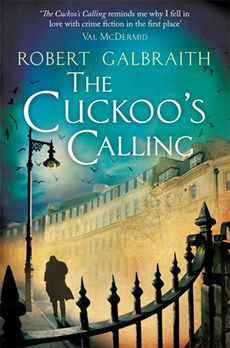Filtered By: Lifestyle
Lifestyle
Book review: 'The Cuckoo's Calling': A study in anonymity
By MEANN ORTIZ

J.K. Rowling wrote the book under the pseudonym Robert Galbraith.
Published in April this year, it is the debut novel of Robert Galbraith, the supposed pseudonym of a former British Royal Military Police who now works in civilian security. It is the first in a series of crime fiction stories featuring Cormoran Strike, a private investigator who shares Galbraith’s military background.
Strike is hired to investigate the death of supermodel Lula Landry. Although the case is officially closed, her adoptive brother is not convinced that she committed suicide. On the same day, Strike gets an unlikely sidekick in the person of Robin Ellacott, who is mistakenly sent by a placement agency to his office as his temporary secretary.
The lawyer did it
On July 14th, The Sunday Times, a London-based publication, ran a story about how they investigated the book’s authorship and eventually got Rowling’s representatives to confirm that she was the author behind Galbraith. One of The Times’ writers apparently received a tip on Twitter from a friend of the wife of one of Rowling’s lawyers. Rowling eventually sued the lawyer.
It’s understandable that Rowling wanted anonymity to be able “to work without hype or expectation and to receive totally unvarnished feedback.” If the reviews of her first adult novel, “The Casual Vacancy”, are any indication, anything she publishes will eventually be compared to “Harry Potter” even if it’s a different genre, or judged not on the merits of the story but because it was written by J.K. Rowling.
The response she eventually received as Galbraith was generally positive, and she was happy with Galbraith’s success even though the book didn’t make a splash in bestseller lists.
“Although Robert had only been in print for three months, he had sold 8,500 copies across all formats (hardback, ebook, library and audiobook), reached number one on the UK audiobook charts, and received two offers from television production companies,” she says in the F.A.Q. section of Galbraith’s website. “Robert’s success during this period compared favorably with J.K. Rowling’s success during the equivalent period of her published career.”
Rowling’s fingerprints
I wish I did not know that Rowling wrote this book so that I can give her the “unvarnished feedback” that she wanted. But at the same time, I doubt that I would have read it at all because it doesn’t sound particularly compelling among the hundred other titles on the crime and mystery shelf.
As it turns out, “The Cuckoo’s Calling” is standard fare as detective novels go. There’s a quirky private investigator, an able sidekick, a tearful client, a high-profile crime, a bevy of suspects, a persistent policeman, several red herrings, and clues hiding in plain sight.
Galbraith did nothing groundbreaking—the novel is too safe—and this is probably the only indication that this is supposed to be a debut novel. Other than that, the book feels too polished to be someone’s first publishing attempt. The prose is too confident, the pacing is measured, the plot is too carefully constructed, and the ending is very neat. It’s also about a hundred pages longer than your average detective novel, and longer than a good number of debut books I’ve read.
What makes “The Cuckoo’s Calling” special are elements that Rowling’s books are known for. Had we not known Galbraith’s real identity, these would just have been attributed to his talent, but I couldn’t help but spot these when I was reading and to take them as validation that Galbraith is, indeed, Rowling.
Rowling is great at creating characters (and with unusual or alliterative and meaningful names at that), which is evident in the Potter books. It was also what I appreciated most in “The Casual Vacancy”, and what kept me reading when it became too dragging and grim.
Cormoran Strike is determined, resourceful, and intelligent. In my mind, he looks like Hagrid, Sirius Black, and Mad-Eye Moody combined. (That’s another downside to knowing that it was Rowling.) He is unsure of how to act around his attractive, happily-engaged new employee.
Robin Ellacott, meanwhile, is inquisitive, has initiative, and secretly dreams of being a detective herself. She wants to live her dream badly enough that she takes a pay cut, and turns down a more lucrative job offer.
This unlikely duo, despite not being as dynamic as Batman and the Boy Wonder, is fun to read because their relationship is symbiotic but also entertainingly awkward. It’s the kind of interaction you do not normally see in detective fiction.
The evocative depiction of the city and the celebrity scene—strangely more reminiscent of an older period than the present—also brings London to life as another character. And she is just as suspect as the other supporting characters in driving Lula Landry to her demise.
Fame and its attendant pros and cons are a recurring theme with several characters including Strike himself, who is an illegitimate son of a rock star and his famous groupie. The rather heavy-handed resulting social commentary written with dark humor and wit is something you don’t see in crime fiction very often either, but it is par for the course in Rowling’s work.
An editor who admitted to turning “The Cuckoo’s Calling” down for publication described it as a “quiet book”. Indeed, it’s as quiet as Lula’s mother on sedatives—there are no gripping action sequences, nail-biting confrontations with suspects, or flashy Holmes-esque revelations. Despite that, I found the novel engaging, thought-provoking, and entertaining—a very promising debut for Galbraith and a successful transition to another genre for Rowling.
Meann Ortiz is an engineer, freelance writer, and blogger at The Girl Who Read and Other Stories. The opinions expressed in this review are solely her own.
More Videos
Most Popular



